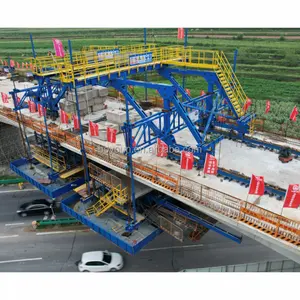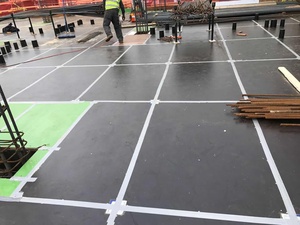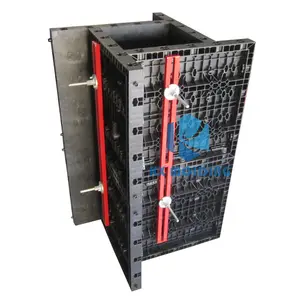What is Fiber-based Formwork Systems
Fiber-Based Formwork Systems are innovative solutions designed for the construction industry, offering an efficient and cost-effective method for creating concrete structures. These systems use a combination of high-strength fibers, such as glass or steel, and a binding agent, such as cement, to form a reinforced concrete shell. The primary function of fiber-based formwork systems is to replace traditional steel or plywood formwork while providing additional tensile strength and ductility, which allows for the construction of thinner, lighter concrete elements.
These formworks cater to a wide range of users, including contractors, builders, and manufacturers who are involved in the production of precast concrete elements or in-situ concrete works like beams, columns, and slabs. The systems are also versatile, as they can be used in various applications such as wall panels, staircases, and even for creating complex architectural features.
The principle behind fiber-based formworks is the integration of materials that work in synergy to ensure the durability and stability of the concrete element. The high-strength fibers act as a reinforcement, while the binding agent provides the necessary cohesion. This approach not only simplifies the construction process by reducing the need for extensive steel reinforcement but also enhances the overall performance of the concrete by improving its crack resistance and reducing the risk of shrinkage cracks.
Types of Fiber-Based Formwork Systems
The market offers a variety of fiber-based formwork systems to meet different construction needs:
-
Woven Fiber Formwork: Made from woven textiles, this type is lightweight and provides a smooth finish to concrete surfaces. It is often used for circular columns and beams due to its flexibility and ease of handling.
-
Plastic Fiber Formwork: Constructed from durable plastic materials, this system is designed for multiple uses and can be cut into different shapes easily. It is particularly useful for projects that require a more intricate formwork design.
-
Steel Fiber Formwork: These are heavy-duty formwork systems incorporating steel fibers into the concrete mix. They offer high strength and are often used in industrial settings where large, solid structures are being built.
-
Aluminum Fiber Formwork: Combining lightweight aluminum with synthetic fibers, this type of formwork offers strength and durability while being easy to assemble and disassemble. It is commonly used for high-rise building constructions.
-
Bamboo Fiber Formwork: An eco-friendly option, bamboo fiber formwork uses bamboo instead of traditional wood or metal forms. It is lightweight and can be used for both flat and curved surfaces.
Each type has its own set of common use cases based on its properties such as weight, strength, and ease of use in particular applications.
How to choose Fiber-based Formwork Systems
Selecting the right Fiber-Based Formwork System involves careful consideration of several project-specific factors. Businesses engaged in B2B sales should guide their clients through the following aspects:
-
Material Compatibility: The chosen system should be compatible with the type of material being used. For instance, a system designed specifically for concrete may not be suitable for other materials like clay or asphalt.
-
Project Scale: The size of the project will influence whether a modular system that can be easily assembled and disassembled is preferable over a more robust system designed for repetitive use.
-
Reusability: Depending on the frequency of use and the complexity of future projects, businesses may opt for a system that offers higher reusability such as steel or aluminum alloy.
-
Eco-Friendliness: Projects aiming to adhere to sustainable practices may choose a system made from recyclable materials or those that reduce environmental impact.
-
Customization: Some projects may require customized formwork solutions such as unique shapes or designs. Suppliers who can provide tailored solutions through their B2B platforms will add value.
By considering these factors alongside the types of fiber-based formwork systems available on Alibaba.com, businesses can make informed decisions that align with their project requirements and procurement preferences.
About Fiber-based Formwork Systems on Alibaba.com
Alibaba.com stands out as an exceptional marketplace for sourcing wholesale fiber-based formwork systems due to its extensive network of suppliers offering a wide array of products tailored to meet diverse construction needs. The platform's commitment to facilitating global trade is evident through features that streamline the procurement process—from intuitive search capabilities that help buyers find products easily to secure payment methods under Trade Assurance.
By choosing Alibaba.com for your bulk purchasing requirements, you gain access to a vast selection of formwork systems suitable for various applications including large-scale industrial projects or specialized residential developments. The platform's emphasis on connecting buyers with reputable suppliers ensures that you can find products that adhere to international standards while taking advantage of competitive pricing structures designed to cater to businesses at every stage of growth.
Furthermore, Alibaba.com's dedication to fostering long-term business relationships means that you can source products confidently knowing that you have support at every step, whether it's securing free spare parts or receiving onsite training. This focus on customer satisfaction makes Alibaba.com an ideal partner for businesses looking to procure high-quality fiber-based formwork systems efficiently and reliably.
Common FAQs for Fiber-based Formwork Systems
What are the benefits of using fiber-based formwork systems?
Fiber-based formwork systems offer high strength, durability, and resistance to moisture, making them well-suited for concrete construction projects. Their lightweight nature also allows for easier handling and transportation, saving time and labor.
How do fiber-based formwork systems compare to traditional timber formwork?
Fiber-based formwork systems are often more durable, lightweight, and cost-effective compared to traditional timber formworks. They also offer a smooth surface finish and are resistant to moisture, reducing the need for additional treatments.
Can fiber-based formwork systems be reused or recycled?
Many fiber-based formwork systems are designed for reuse and can be recycled at the end of their lifespan, depending on the material and local waste management regulations.
Are there environmentally friendly options available for fiber-based formwork systems?
Yes, there are environmentally friendly options such as aluminum alloy and certain types of recycled plastic composites that can be used as sustainable alternatives to traditional timber formworks.
What types of surfaces can be finished with fiber-based formwork systems?
Fiber-based formwork systems can be used on a variety of surfaces including plywood, steel, aluminum alloy, and even certain plastic composites, depending on their specific properties and the requirements of the project.
How does the weight of fiber-based formwork impact construction?
The weight of the formwork system is an important consideration for ease of handling and transportation. Lighter systems are easier to maneuver, reducing the need for heavy machinery on site.
Is it possible to customize fiber-based formwork systems?
Customization options are often available, ranging from material choices to the dimensions and features of the formwork systems, which can be tailored to specific project requirements.
What is the expected lifespan of a fiber-based formwork system?
The lifespan of a fiber-based formwork system varies depending on the material used, frequency of use, exposure to elements, and maintenance practices. Generally, well-maintained systems can last for several projects.
Can fiber-based formwork systems be used for all types of concrete construction projects?
Fiber-based formworks are versatile and can be used in various concrete construction projects. However, the suitability may depend on factors such as the size and type of the structure, local weather conditions, and specific project requirements.
Are there any limitations to using fiber-based formworks in construction?
While fiber-based formworks can be used in many applications, there may be limitations based on the complexity of the structure and the specific properties of the fiber material chosen. It is important to consult with industry professionals to ensure suitability for the project's unique needs.
How do I dispose of or recycle fiber-based formwork at the end of its life cycle?
Disposal or recycling options depend on the material's recyclability. Some systems can be recycled or reused if made from recyclable materials, while others may need to be disposed of according to local regulations due to their composition.
Do fiber-based formwork systems require special training for installation and use?
While many systems are designed for ease of use and can be installed by following the provided instructions, some may benefit from professional training to ensure proper installation and safety on site.
Can I use fiber-based formworks for unique or one-off projects?
Fiber-based formworks can be used for unique or one-off projects; however, the level of customization and reusability will depend on the complexity of the design and the quantity needed.











































 浙公网安备 33010002000092号
浙公网安备 33010002000092号 浙B2-20120091-4
浙B2-20120091-4